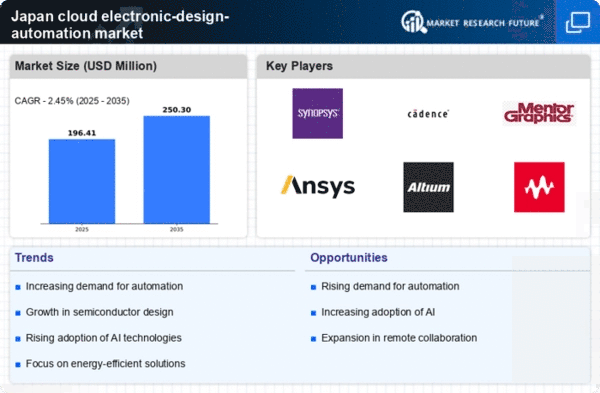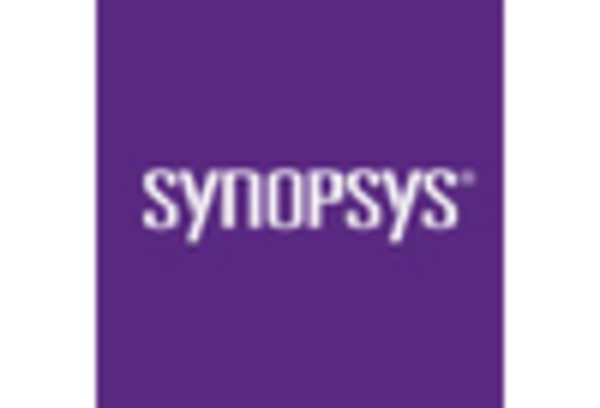Integration of IoT and Smart Technologies
The integration of Internet of Things (IoT) and smart technologies is driving growth in the cloud electronic-design-automation market in Japan. As industries increasingly adopt IoT solutions, the complexity of electronic designs escalates, necessitating advanced design tools. The cloud electronic-design-automation market is expected to grow by approximately 25% annually as companies seek to develop innovative IoT devices. This growth is fueled by the need for efficient design processes that can accommodate the rapid evolution of smart technologies. Consequently, cloud-based electronic design automation tools are becoming essential for organizations aiming to stay competitive in the fast-paced electronics landscape, enabling them to create sophisticated designs that meet the demands of the IoT market.
Shift Towards Remote Work and Collaboration
The cloud electronic-design-automation market is benefiting from a notable shift towards remote work and collaborative design practices in Japan. As companies adapt to new work environments, the demand for cloud-based tools that facilitate remote collaboration is on the rise. This trend is particularly evident in the electronics sector, where design teams are increasingly distributed across various locations. In 2025, it is estimated that over 60% of design teams in Japan will utilize cloud electronic-design-automation solutions to enhance collaboration and streamline workflows. This shift not only improves efficiency but also allows for greater flexibility in design processes, making cloud solutions an attractive option for organizations looking to optimize their operations.
Focus on Sustainability and Energy Efficiency
Sustainability and energy efficiency are becoming critical considerations in the cloud electronic-design-automation market in Japan. As environmental regulations tighten and consumer preferences shift towards eco-friendly products, companies are increasingly prioritizing sustainable design practices. The cloud electronic-design-automation market is likely to see a rise in demand for tools that facilitate energy-efficient designs, with projections indicating a growth rate of 20% in this segment by 2025. This focus on sustainability not only aligns with global trends but also enhances the reputation of companies in the electronics sector. By leveraging cloud-based solutions, organizations can optimize their design processes to minimize energy consumption and reduce waste, thereby contributing to a more sustainable future.
Rising Demand for Advanced Semiconductor Solutions
The cloud electronic-design-automation market in Japan is experiencing a surge in demand for advanced semiconductor solutions. This is largely driven by the increasing complexity of electronic devices and the need for high-performance computing. As industries such as automotive, consumer electronics, and telecommunications evolve, the requirement for sophisticated semiconductor designs becomes paramount. In 2025, the semiconductor market in Japan is projected to reach approximately $40 billion, indicating a robust growth trajectory. This demand necessitates the adoption of cloud-based electronic design automation tools, which facilitate faster design cycles and improved collaboration among design teams. Consequently, the cloud electronic-design-automation market is poised to benefit significantly from this trend, as companies seek to enhance their design capabilities and reduce time-to-market for new products.
Government Initiatives Supporting Digital Transformation
The Japanese government is actively promoting digital transformation across various sectors, which is positively impacting the cloud electronic-design-automation market. Initiatives such as the 'Society 5.0' strategy aim to integrate advanced technologies into everyday life, thereby fostering innovation in electronic design. By 2025, government funding for digital initiatives is expected to exceed $10 billion, encouraging companies to adopt cloud-based solutions for electronic design. This support not only enhances the competitiveness of Japanese firms but also drives the adoption of cloud electronic-design-automation tools, as organizations seek to align with national objectives. As a result, the market is likely to witness increased investment in cloud technologies, further propelling growth in the sector.
















